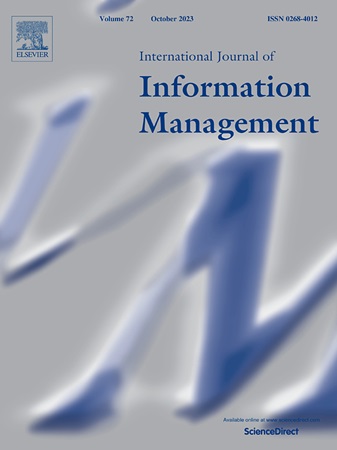Group closeness effects on co-owned information sharing: A multilevel perspective
IF 27
1区 管理学
Q1 INFORMATION SCIENCE & LIBRARY SCIENCE
International Journal of Information Management
Pub Date : 2025-09-16
DOI:10.1016/j.ijinfomgt.2025.102977
引用次数: 0
Abstract
Co-owned information contains personal details about multiple individuals, often nested within a social group. It is important to study the sharing of such information because its careless disclosure can violate the privacy of all co-owners. What makes such sharing decisions unique is that they are often conducted within a tight social context, the attributes of which can systematically affect the decisions of all individuals nested within the group. This necessitates multi-level theorizing and testing. Doing so, we theorize the impact of group closeness (a group-level attribute) on co-owned information sharing by the group members (individual-level reflections and behaviors). We tested our ideas through a deceptive procedure: ninety participants in 40 groups were asked to voluntarily share a co-owned photo of 2–3 group members, for algorithm training purposes (cover story). Hierarchical Linear Modeling revealed (1) the retained relevance of self-centered private information sharing motivators and deterrents in group contexts, and (2) a cross-level effect of group closeness: it weakened the negative effect of privacy concerns on actual co-owned information sharing. The findings underscore the role of social context in determining the potency of privacy concerns to drive the privacy behaviors of individuals nested within this context.
群体亲密度对共有信息共享的影响:一个多层次的视角
共同拥有的信息包含多个个体的个人详细信息,通常嵌套在一个社会群体中。研究这些信息的共享是很重要的,因为它的不小心披露可能侵犯所有共同所有者的隐私。这种共享决策的独特之处在于,它们通常是在紧密的社会背景下进行的,这种社会背景的属性可以系统地影响嵌套在群体中的所有个体的决策。这需要多层次的理论和测试。为此,我们将群体亲密度(群体层面属性)对群体成员共同拥有的信息共享(个人层面的反思和行为)的影响理论化。我们通过一个欺骗程序来测试我们的想法:40个小组中的90名参与者被要求自愿分享2-3名小组成员的共同拥有的照片,以进行算法训练(封面故事)。层次线性模型揭示了(1)以自我为中心的隐私信息共享激励因素和阻止因素在群体情境下的保留相关性;(2)群体亲密度的跨层次效应:它削弱了隐私关注对实际共有信息共享的负面影响。研究结果强调了社会环境在决定隐私关注的效力方面的作用,以驱动嵌套在该环境中的个人的隐私行为。
本文章由计算机程序翻译,如有差异,请以英文原文为准。
求助全文
约1分钟内获得全文
求助全文
来源期刊

International Journal of Information Management
INFORMATION SCIENCE & LIBRARY SCIENCE-
CiteScore
53.10
自引率
6.20%
发文量
111
审稿时长
24 days
期刊介绍:
The International Journal of Information Management (IJIM) is a distinguished, international, and peer-reviewed journal dedicated to providing its readers with top-notch analysis and discussions within the evolving field of information management. Key features of the journal include:
Comprehensive Coverage:
IJIM keeps readers informed with major papers, reports, and reviews.
Topical Relevance:
The journal remains current and relevant through Viewpoint articles and regular features like Research Notes, Case Studies, and a Reviews section, ensuring readers are updated on contemporary issues.
Focus on Quality:
IJIM prioritizes high-quality papers that address contemporary issues in information management.
 求助内容:
求助内容: 应助结果提醒方式:
应助结果提醒方式:


